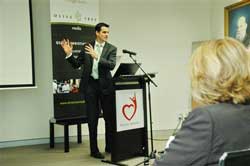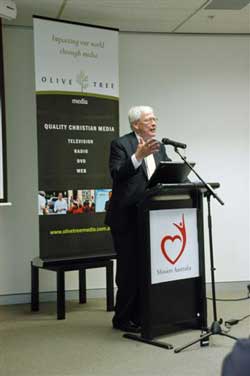New research on key belief blockers and Australian's views on faith, Christianity and God has been launched in Sydney as a 'gift to Australian churches'.
Olive Tree Media, run by Gymea Baptist Pastor Karl Faase, commissioned McCrindle Research to conduct an online survey and focus groups on a national sample, across Generations Y and X, as well as baby boomers.
The findings showed that 4 in 10 Australians consider themselves as Christian, identifying as Catholic, Orthodox, Protestant or Evangelical. 1 in 5 indicated that whilst they were spiritual, they were not religious. Furthermore, 3 in 10 did not identify with any religion or spiritual belief. Overall, 1 in 2 Australians do not identify with a religion. Of the religious, many were not active with over half indicating that they were not at all active in practising religion, never worshipping as part of a group.
Generational breakdown
Baby Boomers were more likely to consider themselves Christian, with 41% compared with 30% of Gen X’s and 24% of Gen Y’s. Gen Y’s were also the most likely to have issues with Christianity, 17% , compared to 6% of Baby Boomers. Gen Y were also more likely to be passionately opposed to Christianity, with just under 8% stating this, compared to 4% of Gen X’s and just 3% of Baby Boomers.
Younger Australians were more likely to be open to other religious views, with 14% expressing that they were somewhat open. That is, whilst they were not actively looking to change their religious views, a change was certainly possible (compared with 9% of Baby Boomers). Baby Boomers were much more committed to their religious beliefs, with almost 3 in 5 (57%) stating that they were not open at all to changing their current religious view (compared with 43% of Gen Y’s).
The figures on openness to changing belief were encouraging, because although 51 percent of all non-Christian Australians stated that they were strongly committed to their current religious world view, a further 48% were open to change. In fact 7% expressed an extreme or significant openness to exploring and investigating other religious views and practices.

Researcher Mark McCrindle detailing the figures (Photo: Ramon Williams)
Belief Blockers
The so-called belief blockers vary, according to whether those surveyed were open or not to changing their religious views.
Among those not open, issues like the church's stand on homosexuality and the belief in the Bible, were significant. Half of that group said that these two issues blocked them completely from engaging with Christianity. The same figure dropped by half when it came to non-Christians who were open to changing their religious world views. For that group, the issue of a good God allowing suffering in the world was the number one belief blocker.
On the issue of church abuse, the McCrindle report said "It was notable that church scandals were more of a negative influence for non-Christians not open to changing their religious views, rating it as the second highest belief blocker (compared to those open to changing their religious views rating it as the fourth belief blocker)".
Celebrity Christians
A strong finding also was that Australians said they were turned off by public figures or celebrities sharing about their faith, as indicated by 70% of respondents. Interestingly, 1 in 3 indicated that this strongly repelled them from investigating religion and spirituality.
Archbishop Peter Jensen, in launching the report and commenting on its findings, said he was not surprised by this. "I think it is cultural. I think Americans tend to go in for that kind of thing and Aussies don't, I can understand that. But yet you would also say that when we had a series of Inspiring People events in 2009, it worked well. It wasn't big time celebrities, who during trophy presentation, come out and say 'I believe in Jesus, and thank God for giving me this trophy'. It was real people speaking and for some people at least, this was a very powerful way of speaking the Gospel".
Family 'pivotal'
Dr Jensen also agreed with the stress the report lays on family upbringing as a source or strengthener of belief.
2 in 3 Australians cited the strong influence of parents and family on shaping their religious beliefs.
"The transmission of faith through families is immensely significant. People praying for people, teaching their children and living the Christian life is the biggest single evangelistic thing we do" Archbishop Jensen told the audience at the launch.'

Archbishop Jensen (Photo: Ramon Williams)
Apart from family, one quarter of respondents said their beliefs were shaped were shaped by their networks and relationships, 20% said that their religious views and beliefs were mostly informed through books and articles; personal research and readings they have conducted about Christianity. For 25 percent, the media, social media and the internet were pivotal in influencing religious worldviews.
Mr Faase said the research would be available 'as a gift to the churches' to think and work through, but he stressed the project was not 'faith by focus groups' but about finding what blocks people from understand the Christian message in order that churches 'can be as clear as we can'.
Olive Tree is raising money for an information rich website and video production, aimed at tackling some of the issues raise in the research.





















